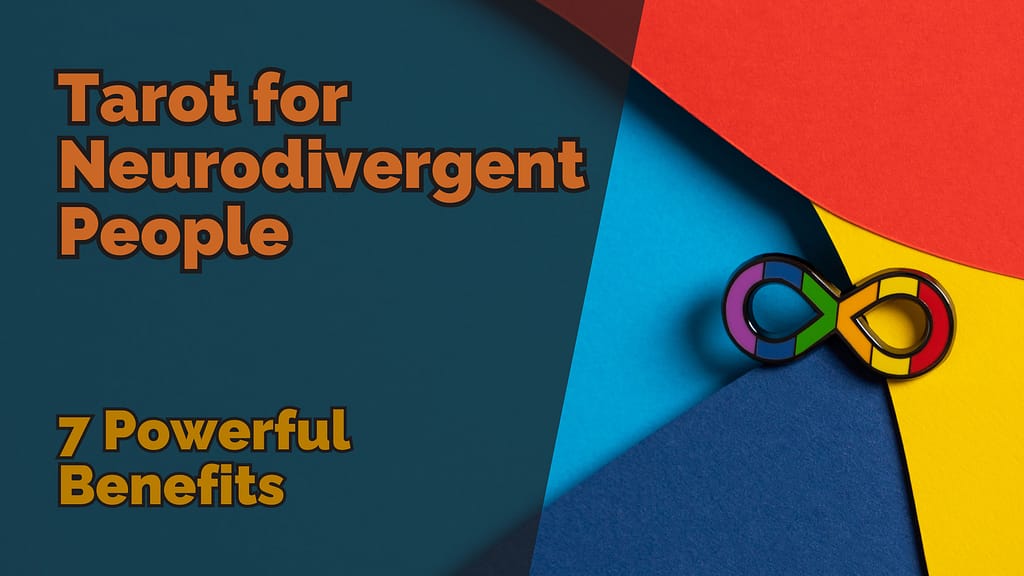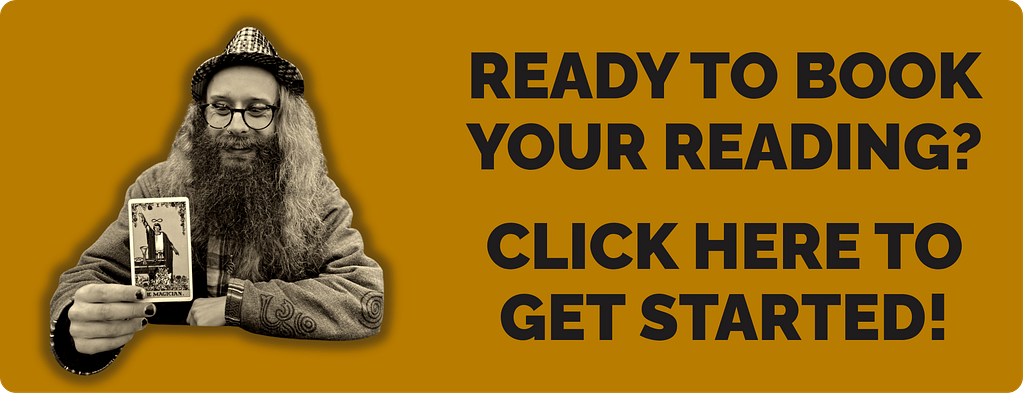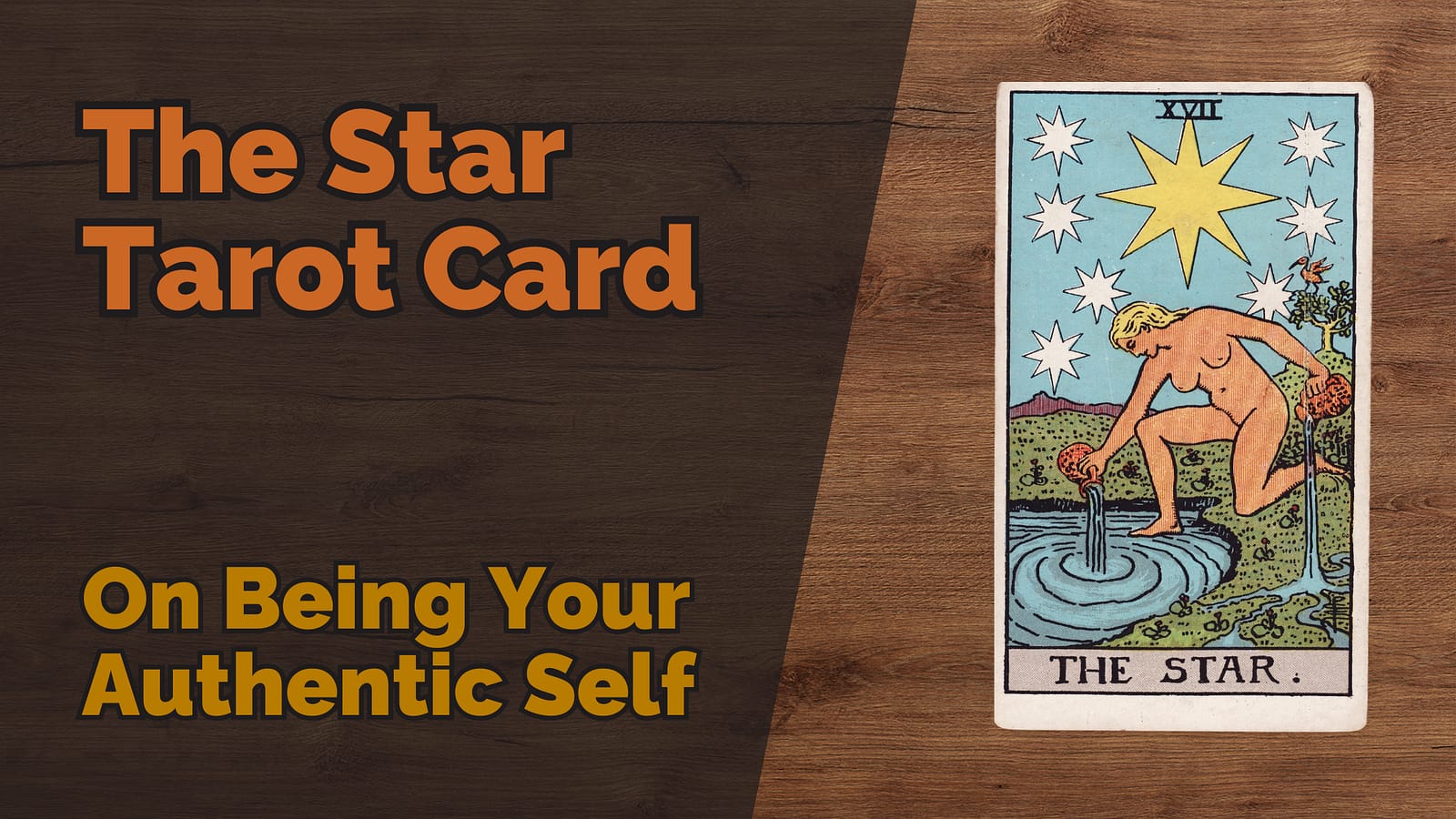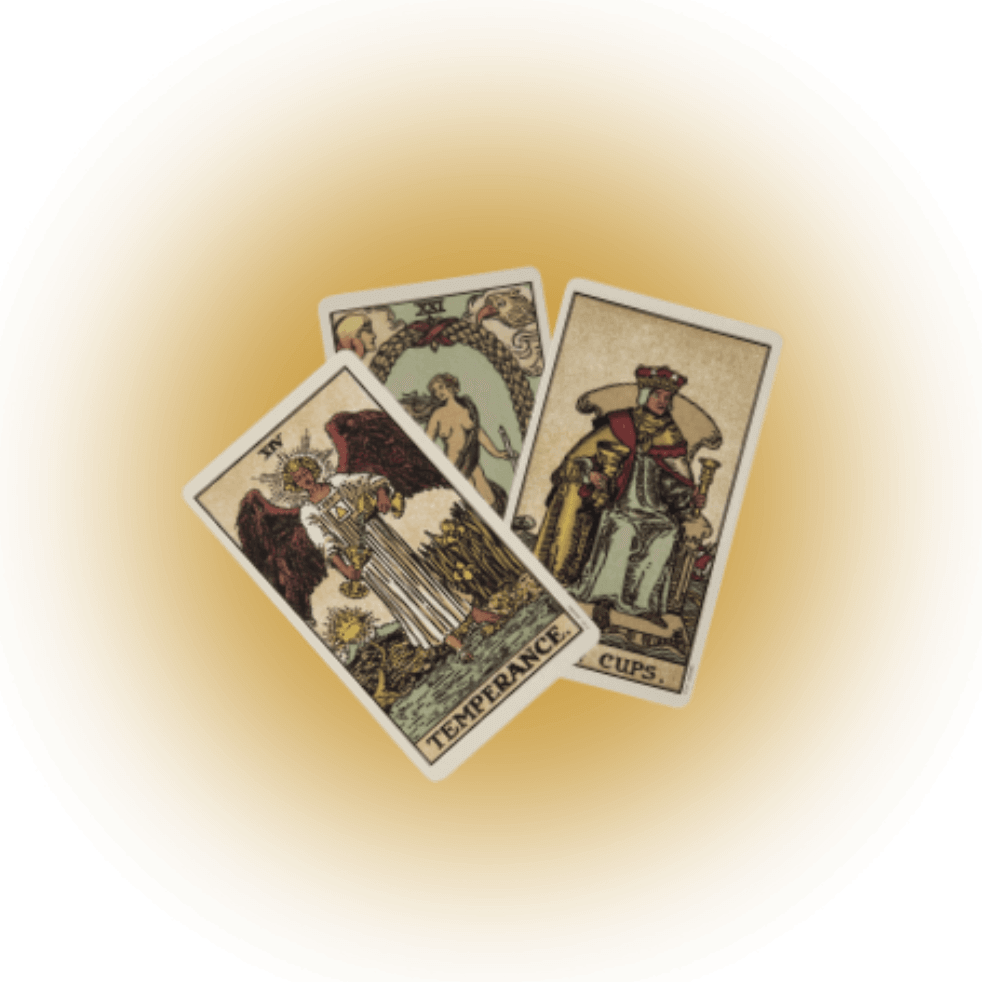
Table of Contents
Living with ADHD, autism, dyslexia, or any other neurological difference means navigating the world differently—and often finding that typical tools don’t quite work for you. That’s where tarot comes in. Tarot for neurodivergent people offers a flexible, intuitive, and adaptable way to process emotions, make decisions, and gain clarity.
Tarot isn’t just for the mystically inclined. For neurodivergent individuals, it can become a practical tool for managing daily challenges, reducing overwhelm, and exploring deeper thoughts and feelings. Whether you’re learning tarot or getting a neurodivergent-friendly tarot reading, here are seven key ways tarot can benefit neurodivergent folks.
1. Simplified Self-Reflection
The Challenge of Self-Reflection for Neurodivergent People
Self-reflection is often a challenge for neurodivergent people. Those with ADHD can struggle to focus long enough to engage in meaningful reflection, while autistic individuals may feel overwhelmed by the sensory and emotional intensity that comes with reflecting on thoughts and feelings. Neurotypical reflection techniques often fall short, leaving you searching for a method that works better for your brain.
How Tarot Makes Self-Reflection Easier
Tarot helps make self-reflection more manageable by giving you something tangible to focus on. Instead of trying to sift through a whirlwind of thoughts or emotions, you pull a card and let its imagery and symbolism guide your reflection. For example, pulling The Hermit card encourages you to look inward and seek solitude for deeper contemplation. It offers a way to engage in self-reflection without feeling overwhelmed by the process.
For individuals using tarot for ADHD, this approach is particularly helpful. It allows you to narrow your focus to a single card, offering a structured way to engage with your inner world without getting lost in overthinking.
2. Grounding in a Neurodivergent World
Why Grounding is Essential for Neurodivergent People
For many neurodivergent people, grounding practices are a must. ADHD can leave you feeling scattered, like your thoughts are constantly jumping from one thing to another, while autistic individuals might experience sensory overload that makes it difficult to feel centred. Grounding rituals can help create a sense of calm and stability in a world that often feels chaotic.
How Tarot Can Ground You
Incorporating tarot into your daily routine can serve as a grounding practice. Pulling a card each morning offers a consistent, calming ritual to help you focus your energy and thoughts. For those using tarot for autism, this repetitive structure can be especially comforting. The act of shuffling the deck, pulling a card, and reflecting on its meaning provides a predictable moment of calm amidst the noise.
Before I begin any neurodivergent-friendly tarot reading, I always guide my clients through a grounding meditation. This practice creates a calm, focused space for us to explore the tarot cards together, helping clients feel more connected and present during the reading. For neurodivergent individuals, this grounding approach makes it easier to engage with the reading without feeling overwhelmed.
3. Managing Emotional Overwhelm
The Emotional Struggles of Neurodivergent People
Many neurodivergent individuals, particularly those with ADHD or autism, struggle with emotional regulation. Emotions can feel intense and difficult to process, making it challenging to work through them in a healthy way. For some, these emotions can hit like a tidal wave, while others may find it difficult to verbalise their feelings, especially when sensory issues add to the overwhelm.
How Tarot Helps with Emotional Regulation
Tarot offers a non-verbal, visual way to process emotions, which can be incredibly helpful for neurodivergent people. Instead of needing to talk through every feeling, you can pull a card that represents what you’re experiencing and use that symbol as a starting point for reflection. For example, pulling the Three of Swords might help you identify and process feelings of heartbreak, grief, or sadness.
For people using tarot for autism, this approach allows them to explore emotions in a more structured, less overwhelming way. By seeing their emotions reflected in a card, they can engage with those feelings without needing to find the right words or risk being overwhelmed by sensory input. Similarly, tarot for ADHD helps by offering a visual tool for slowing down and engaging with emotions, preventing the rush of thoughts from becoming too overpowering.
4. Customised Tarot Learning for Neurodivergent Minds
Why Traditional Tarot Learning Feels Overwhelming
Learning tarot’s 78 cards, each with its own layers of meaning, can feel overwhelming for neurodivergent learners. ADHD can make it hard to focus on memorising card meanings, while autistic individuals may find the ambiguity of tarot challenging. Standard tarot learning methods might feel rigid or difficult to navigate for those who need more flexibility.
How to Make Tarot Learning Accessible
Tarot learning doesn’t have to be rigid. By focusing on personal connection rather than memorisation, tarot becomes much more accessible for neurodivergent learners. In my workbook Simply Tarot, I’ve simplified card meanings, breaking them down into a few key concepts to help people engage with tarot at their own pace.
For those using tarot for ADHD, this bite-sized approach makes learning the cards easier without feeling like an overwhelming task. Journaling about your reflections on each card can also help personalise your experience, creating a deeper connection with tarot. For autistic individuals, focusing on what the cards mean to you personally allows for a more meaningful, flexible approach to learning.
5. Tarot as a Decision-Making Tool
Decision Paralysis in Neurodivergent People
Decision-making can be a major challenge for neurodivergent people. ADHD often brings executive dysfunction, which makes it difficult to get started on the decision-making process, while autistic individuals may struggle with decision paralysis, feeling overwhelmed by the need to make the “perfect” choice. Both scenarios can leave you feeling stuck, unsure of how to move forward.
How Tarot Can Simplify Decisions
Tarot provides a structured way to navigate decisions. By pulling a few cards, you can map out different options and visualise possible outcomes. This process helps make decision-making more manageable, giving you a tangible way to explore the paths available to you. Rather than being paralysed by the fear of making the wrong choice, tarot offers insight into the potential consequences of each decision.
Many neurodivergent individuals find that tarot helps them break free of decision paralysis. By externalising the decision process, you can move forward with more confidence and less anxiety. For people with ADHD, tarot helps create structure around decisions, turning what feels like an overwhelming task into something more straightforward.
6. Personalising Tarot Readings for Neurodivergent Clients
The Importance of Flexibility in Readings
Tarot readings are not a one-size-fits-all experience, and this is especially true when using tarot for neurodivergent clients. Each person has their own needs, and it’s important to create a reading environment that supports them. Some clients may need more time to process the cards, while others might benefit from sensory tools like fidget toys to help them focus during the reading.
How I Adapt Tarot for Neurodivergent People
In my neurodivergent-friendly tarot readings, I take extra care to tailor the experience to each client’s needs. If someone needs more time to process, I allow for extra pauses between cards. For clients who find comfort in sensory tools, I make sure they have access to items like fidget toys during the session. I also give clients the option to choose from multiple tarot or oracle decks, allowing them to take more control over the experience.
This personalised approach helps neurodivergent clients feel more comfortable and supported, creating a reading that’s accessible, engaging, and meaningful. By providing flexible options and adapting to individual needs, I ensure that every client leaves the reading feeling empowered.
7. Empowering Neurodivergent People with Tarot
Tarot as an Empowerment Tool
At its core, tarot is about empowerment. It gives you insight into your life, offering clarity around the challenges and decisions you face. Tarot, for neurodivergent people, provides an accessible way to reflect on life, helping you process emotions and make decisions with confidence. Rather than feeling stuck or overwhelmed, tarot offers you the tools to navigate life on your terms.
Building a Personal Tarot Practice
For those interested in learning tarot, it’s important to start small and build your practice at your own pace. There’s no need to memorise every card or follow strict rules—your tarot journey is yours to shape. Whether you’re using tarot for autism, tarot for ADHD, or just seeking a new way to process life’s challenges, tarot can become a powerful tool in your personal growth and self-discovery.
Conclusion
Tarot offers neurodivergent people a flexible, empowering tool for self-reflection, emotional regulation, and decision-making. Whether you’re looking to learn tarot or experience a neurodivergent-friendly tarot reading, tarot can help you engage with life’s challenges in a way that feels supportive and aligned with your needs. Ready to explore? Book a reading with me in Manchester or online, or check out my workbook Simply Tarot to start your own tarot practice.





